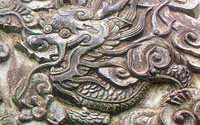The desire to achieve harmony between the self and the non-self remains an essential preoccupation of the Vietnamese in interpersonal relations outside the family group. The basic principles underlying family relationships is extended to the relationships between members of wider social groups.
The concept of society as an extension of the family is evident in the transposition into the social usage of a language originally intended for domestic life. Vietnamese uses more than a score of kinship terms as personal pronouns. The choice of the appropriate word depends on the relative age, social status, gender, degree of acquaintance, respect, and affection between speakers and hearers who are not related to each other by blood or marriage.
In Vietnamese society, the predominant sentiment in the relation between members of a social group is respect. This is particularly evident in the attitude towards older people. Respect and consideration for old age no doubt derive from the obligation of filial piety that requires young people to respect and love their parents and parent-like members of the family. Vietnamese also recognize that a long life is a sign of kindness and regard on the part of the deity for virtuous people and that the elders are the carriers of tradition and the embodiment of knowledge and wisdom. Old people enjoy high respect in Vietnamese society, irrespective of wealth, education, or social position. This respect is expressed in both attitude and behavior, particularly in the use of special terms of address and stylistic devices. Unlike Western societies that put a premium on youth, Vietnamese society is proud of its old members. Age is an asset, not a liability.
Teachers, even though they are young, enjoy great respect and prestige in Vietnamese society. In Vietnam, the student-teacher relationship retains much of the quality of a son’s respect for his father’s wisdom and of father’s concern for his son’s welfare. The respect that students show to the teachers is also evident in linguistic behavior. The terms of address that students use in speaking to their teachers are the same as those they use in speaking to their parents.
Respect is expressed in the form of courtesy and in the effort to spare others from the humiliation of losing face. The face is extremely important for the Vietnamese. The individual who loses face will have to endure public ridicule and derision in the midst of his community. Furthermore, the family shares any social disgrace incurred by the individual.
Linguistic devices are one of the many ways that allow the Vietnamese speaker to save face and at the same time allow others to save face. Depreciatory terms are applied to oneself and complimentary terms are used for others. The practice of “beating about the bush” to avoid answering a request in the negative, and the tendency of the Vietnamese student to say yes to questions asked by his teacher stem from this preoccupation with saving face.
“You and I” in Vietnamese
In America, people put emphasis on friendliness in interpersonal relationships while in Vietnamese society the emphasis is more on respect. We may say without fear of error that respect is the cornerstone of interpersonal relationship in Vietnamese society, whether in the family or in social circles, whether on the employment scene or between friends and lovers. This is reflected in the language used by Vietnamese in their daily life.
In making an utterance, Vietnamese simultaneously expresses ideas and concepts and an attitude of respect (or disrespect) towards the hearer. This expression is natural because it is inherent in the nature of the words used, and generally neither the speaker nor the hearer is conscious of it. But, if the speaker unintentionally (or purposely) uses a word reflecting an attitude of disrespect, the hearer will instantly realize it and react to it accordingly.
American people use the only word, the word yes, to express agreement and this word is neutral as to respect or disrespect. Of course, an answer with the mere word yes lacks the courtesy conveyed by a longer answer such as “Yes, I am”; “Yes, he did”; or “Yes, Mr. Brown”. On the contrary, the Vietnamese speaker must choose between Da., Va^ng, Pha?i to express agreement. No well-bred Vietnamese would use ¯ as an answer in talking to his parents, older people, his teacher, his superior, or monks, and priests. In Vietnamese, other people invite us to xo+i (“eat rice” or “take a meal”), but in replying, we must say that we have already or not yet æn (eat) and not xo+i. How complicated it is!
The difference between the linguistic behavior of American and Vietnamese people can be seen in the use of personal names. In writing a letter to a person who is not known, to ask for information or to apply for a job, example, Americans will usually use the term Dear followed by the person name (the last name, it should be noted); this shows courtesy and friendliness. Vietnamese people, by contrast, use only terms expressing respect such as kính, kínb tbÜa . . and never address the person by name, for this would convey an impolite, disrespectful attitude. Consequently, “Dear Mr. Brown” is not “O^ng Brown than men” but simply “Thua o^ng” or “Kinh o^ng” (“respected gentleman”).
In American society where almost nobody knows anybody else, even people living in the same apartment complex, mentioning the name of the interlocutor shows that one is interested in and friendly toward him/her, the evidence of which is to be found in the remembering of his/her name. Consequently to show that they are courteous and friendly, American people usually mention the name of the interlocutor in their greetings. (i.e. “good morning, Mr. Brown” or “good-bye, Miss Green” when speaking to people who are not close friends, and “good morning, Bill” or “goodbye, Susie” when speaking to friends. In Vietnamese society, almost everybody knows the name of everybody else living in the same community. The neighbors (called “lang gie^`ng”) are often considered as friends or relatives. In greeting, speakers avoid mentioning the name of the interlocutors, especially those who are senior in age or status
. They are called by name only when they are close friends or junior in age or status. It is easy to imagine the cultural misunderstandings that might arise from first encounters between Vietnamese and Americans.
In Vietnamese, a special respect is conveyed by using function-words for respect when addressing persons such as parents, old people, teachers. monks and priests, and superiors. The verbal response begins with a function-word such as “da.”, “thu+a”, “da. tbu+a”, “ki’nh tbu+a”. Therefore the word “da.”, often translated as yes, is actually a function-word showing respect and does not necessarily indicate agreement.
Personal pronouns are a word class in Vietnamese which best reflects this preoccupation with expressing respect or disrespect for other people in language. American people have one word for you to address parents, brothers and sisters, wife and children, friends and foes, and even animals. Likewise, they have only the word I (or its inflected form me) to refer to themselves when speaking. How convenient it is! But at the same time, those words lack the ability to express feelings of respect or disrespect of tee Vietnamese personal pronouns. People who are senior in age or status are usually referred to with such term of respect as cu., o^ng, ba’c, chu’, anh, tha^`y, cha, ba`, co^. People younger than the speaker, or who have a lower status, are usually addressed or referred to with the terms anh, chi., chu’, em, cha’u, con. To show anger and disdain, the terms ma`y, mi… might be used, and fawning is shown by the use of nga`i or cu. Io+’n.
By observing the use of the terms of respect in Vietnamese, people can guess, to a certain extent, the personality and good manners of the speaker as well as the relationship between speaker and hearer. The use of these words which function as personal pronouns is a very delicate matter that depends on the speaker correctly assessing the relative age, status, and degree of intimacy between speaker and hearer. A man and a woman, at their first acquaintance, will call each other o^ng and to^i (or co^ and to^i). But as the degree of intimacy reaches the level of love, the term o^ng is replaced by anh and the term tp^i will become em. When love is lost, they will revert to the initial ông and tôi. In some cases where anger, hatred, and lack of self-control prevail, o^ng may become ma`y and to^i may become tao. The terms anh/em and ma`y/tao are separated by a Great Wall of feelings and emotions.
Terms of address such as bác, cbú, and anh are perhaps the most difficult to use in Vietnamese because they can express opposing feelings and sentiments. According to the context, they may express respect or disdain, familiarity or contempt. Perhaps they are much more difficult to use than the French words tu/toi which also can express either intimacy or contempt. When we address a stranger tu/toi, the only feeling conveyed is obvious contempt. But a Vietnamese addressing a stranger as bác may mean respect (considering him on the same footing as our father’s elder brother), familiarity and affection (regarding him as his uncle), or outright contempt (looking down on him as having a low social status).
The expression of respect (or contempt) is inherent in the structure of Vietnamese. In using Vietnamese, we cannot overlook this essential feature of Vietnamese culture which is the expression of respect in language.
 Vietnamese Culture and Tradition
Vietnamese Culture and Tradition 

